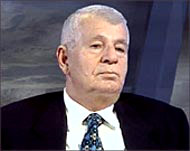Iraqis fail to regain control of oil revenue
The latest Iraqi attempts to recover control of the country’s oil revenues from the United States appear to have hit a dead end with a special delegation being rebuffed in its bid to secure UN help.

The delegation has been in New York in a bid to petition the UN to exert pressure on US occupation authorities, who currently preside over Iraq’s oil output.
It includes Hamid al-Bayati, a deputy in the Iraqi interim foreign ministry and a spokesperson for the Supreme Council of Islamic Revolution in Iraq.
In New York since last week its members have so far failed to get an audience with UN officials.
The control of Iraq’s oil revenue has been controversial ever since the US-led occupation of Iraq in 2003.
The US has imposed secrecy on oil deals, exportation, and use of revenues. Iraqi officials have previously asked for access to oil revenues, but have been turned down by the occupation Coalition Provisional Authority (CPA) headed by Paul Bremer.
Daylight robbery
Muzhir al-Dulaymi, spokesman for the League for the Defence of Iraqi Peoples’ Rights, told Aljazeera the US was systematically milking Iraq of its oil.
 |
|
Dr Abd al-Hay Zallum speaking |
“A daylight robbery is going in Iraq. I have first hand information from sources in al-Bakr port in southern Iraq, and in the Turkish port of Jihan, confirming that three million oil barrels are being taken out of Iraq on a daily basis” al-Dulaymi said.
“Oil sale contracts only go to the Iraqi oil ministry for signing. They cannot say a word about them; not to mention the fact that there are many sealed contracts which the Iraqi ministry of oil is not notified of.”
Al-Dulaymi says the Bush administration is benefiting from the process.
“When oil prices surpassed $30 last year, Bush sent his Energy Secretary to the Middle East, who held talks with Saudi Arabia and other oil producers to reduce prices.
“But here we are now; oil prices have reached $40 and not a word from the Bush administration. Why? Because they are benefitting. Definitely, they will not sacrifice such revenue and give it to Iraqis.”
Motives
US officials have consistently denied that the 2003 invasion was motivated by a desire to seize Iraq’s vast oil reserves.
The latest charge came from the Saudi Arabian ambassador to the UK and Ireland Prince Turki al-Faisal.
“What we read and hear from our commentators in America and sometimes congressional sources, if you remember going back a year ago, there was the issue of the oil reserves in Iraq and that in a year or two they would be producing so much oil in Iraq that, as it were, the war would pay for itself,” the envoy told the Irish Independent on Monday.
“[This] indicated that there were those in America who were thinking in those terms of acquiring the natural resources of Iraq for America.”
Dwindling resources
|
Iraq oil fact box
|
Oil experts agree that in the coming decades, oil resources will run low, and some current oil producers will not be able to maintain current output.
Iraq possesses oil reserves equal to those of US, Canada, Mexico, Western Europe, Australia, New Zealand, and non-middle eastern Asian countries put together.
The deposed Iraqi president Saddam Hussein said in the 1970s that Iraq would provide the last drop of oil in the world.
In 2020, the world will need 112 million barrels of oil a day. Iraq and Arab Gulf states are the only countries which will be able to provide such quantities of oil.
Abd al-Hay Zalloum, an oil expert and author told Aljazeera before the invasion of Iraq that oil should not be forgotten as a US war aim.
“The US produces six to seven million barrels of oil a day. That means oil in the US will be dried out in a decade” he said “the Bush administration sees Iraq as a valuable resource.”
|
US oil fact box:
|
Dr Mohamad al-Douri, the former Iraqi ambassador to the UN believes that the US might give Iraqis control over oil revenues.
“Currently, the US is not after oil revenues. What is more important to them is to secure oil flow in the coming decade, when oil resources run low”, al-Douri said “Their goal now is not the money, but to control the oil flow itself in the future.
“At present Iraq’s oil exportation is not huge, but Iraq possesses one third of the world’s oil reserves, and this is what the US is after. They want to secure their future.”
During the UN sanctions on Iraq 1990-2003, Kuwait, Saudi Arabia, and the United Arab Emirates made up for Iraq’s absence from the oil market.